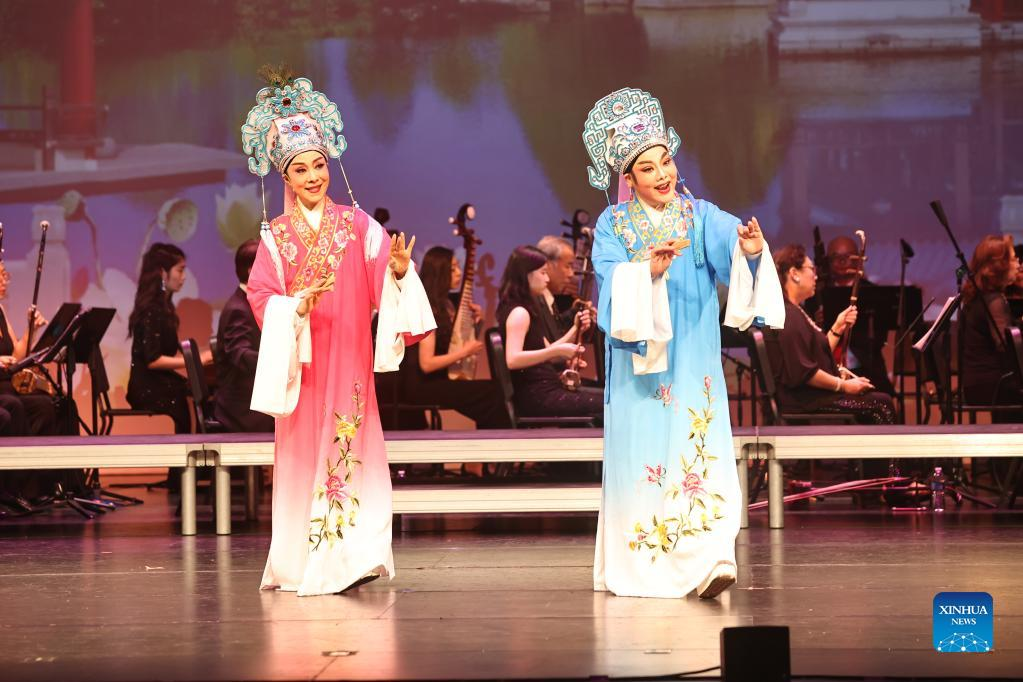Feature: Int'l art festival in Southern California showcases Chinese traditional drama

Artists perform traditional Shaoxing Opera, also called Yue Ju, for audiences at the Bonita Center for the Arts in San Dimas, Los Angeles County, the United States, on Aug. 6, 2022. (Photo by James Mao/Xinhua)
LOS ANGELES, Aug. 8 (Xinhua) -- Hundreds of culturally-oriented people threaded their way into the Bonita Center for the Arts in San Gabriel Valley's San Dimas on the weekend to enjoy an evening of traditional Chinese drama.
Thronging into the auditorium on Saturday were clusters of little kids in fairy party dresses and their elegant mothers in silk, embroidered Chinese gown, as well as indulgent dads on a family fun outing.
Artists presented some excerpts from traditional Shaoxing Opera, also called Yue Ju, including "The Peony Pavilion" and "The Butterfly Lovers," for the audiences in over two hours. Richly costumed characters sang in their signature high-pitched vocals, using graceful hand and body movements with some comic dialogue.
Shaoxing Opera is one of the most popular Chinese opera genres.
Held by the Sino-U.S. Chinese Musicians Association, the largest, most authoritative and professional association of Chinese musicians in North America, the event is the opening ceremony of the 5th U.S. Legacy Festival, an international art festival and competition whose aim is to "promote and improve Chinese culture, Chinese and Western music, and traditional arts, help international communication, and give a platform and stage to outstanding artists showing their talent ability."
It seeks to provide a high-profile stage to enable outstanding artists to showcase their various artistic talent and enable Chinese and Western artists to create and collaborate on traditional and new art forms together.
The festival committee invited musicians, dramatists, artists, dancers, and professors as guest performers and competition judges.
"All of us will be very proud to inherit Chinese and American culture and art and contribute to the world's art," Ye Jin, vice president of the Sino-U.S. Chinese Musicians Association and pipa performer, said in a press release.
Chinese traditional drama combines song, dance, music, poetry, acrobatics, colorful costumes, elaborate makeup and even martial arts, all of which take performers years of intensive study to master. The musicians supporting the singers' performances respond to synchronized cues from the performers that enable them to work in harmony to create a sensitive musical accompaniment that enhances the experience for the entire audience.
The festival and competition committee hopes that the event will continue to foster Chinese traditional culture in the City of Angels and enable the Chinese culture to "shine on the international stage and provide audiences with an unforgettable cultural and musical experience."
Supported largely by parents and grandparents, efforts are being made to reach out to and reengage younger generations of artists, who tend to embrace more modern forms of art and culture, like TikTok, Instagram, cinema and gaming.
"I come because I love the beautiful costumes and exotic face paint - more than the singing," Sophie M., an American student from the University of California, Los Angeles majoring in drama, told Xinhua. "It's fascinating to see how different cultures approach live performance and multi-generational storytelling."
"You'd never get to see this in most places in America, but a strong Chinese-American community here in Los Angeles keeps this interesting tradition alive for everyone to enjoy," Richard L., an LA-based filmmaker, told Xinhua.
Attendees were also welcomed by Chinese Consul General in Los Angeles Zhang Ping, who commended festival organizers and participants for their fine work preserving traditional Chinese culture and creating opportunities to build unique cross-cultural bridges.
Los Angeles County Supervisor Hilda Solis summed it up in a letter, "The residents of Los Angeles County commend your dedication to promote Chinese culture with an emphasis on unity, diversity and inclusion."
"During a time when Anti-AAPI (Asian American Pacific Islander) hate crimes are on the rise, these values are more important in our community than ever before. Your commitment to celebrating arts and culture will have a lasting impact on the San Gabriel Valley for generations to come," she continued.
San Gabriel Valley, renowned for its large Asian American community, is home to over half of Los Angeles County's Chinese American population.


